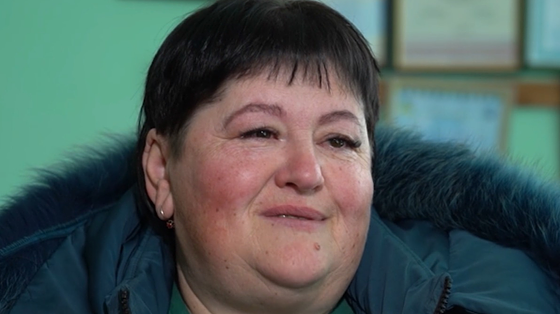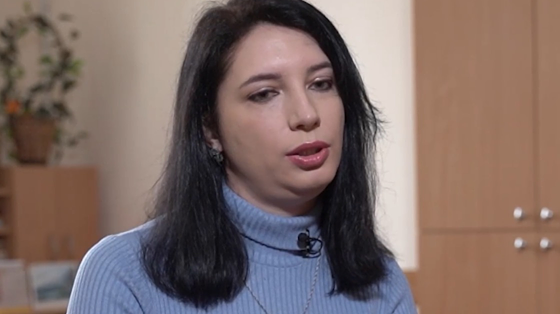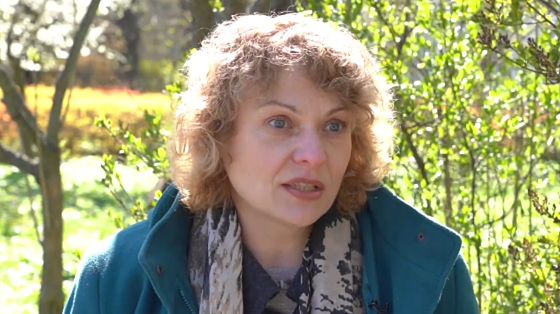Bella Ivanivna, mother:

These are the first MRI scans that were taken after the injury in 2014. Two destructions can be seen: the entrance and exit holes in the skull and the trail of a bullet, which pierced the brain hemisphere diagonally.

Ilya Lutsenko, 19 years old:

I graduated from school and entered [University] in Mariupol. One week was left before the beginning of the studies, but something different happened.
My friends and I were riding. Well, what could we think about the checkpoint? Those were our [soldiers] there. What's the danger there? There weren't even signs that it was dangerous there. Well, there was shooting heard, but that's common for Mariupol. They shoot often.
Once we slept with my girlfriend and woke up at night because they were shooting at something. We ran up to the window, looked out and saw a drone flying. They were shooting at this drone with red bullets from the checkpoint. My girlfriend joked then: they were setting off fireworks. I said that those were hot bullets. The war.
For me, intensive care seemed to be 3-4 days, but they said it was several weeks.
Bella Lutsenko:
The scariest was the very first night after the shot. This was when we came to Mariupol and we were told that he would not make it until the morning. They did not let us into the ward. We could just see him through the window.
Naturally, I couldn't just go to sleep calmly at night. I had to be next to him, so my husband and I stayed in the car outside near the windows and took turns, every 5-10 minutes, looking at him from there. All the time I was telling my husband: ‘Go and have a look if he is breathing or not?’ Because, to be honest, I myself was scared, so we took turns watching. It was a terrible night, and sometimes I hardly remember it, my memory fails. I couldn't reach [the window], so my husband brought some bricks to climb up and look through the window.
My son still made it until the morning, and moreover, he even began to breathe himself, the artificial respiration unit was turned off. The doctor told us straight that there was no chance in Mariupol, he needed to be transported to Dnipropetrovsk (now called Dnipro). Doctors there made many similar operations with gunshot wounds. And it was advisable for us to get there. We had a chance there.
Therefore, we were taken to the airport by ambulance, put into a helicopter and transported to Dnipropetrovsk. We were afraid that he would simply not make it, that he could die on the way. That is why we consulted with a professor from Dnipropetrovsk first. He asked about Ilya's condition at that moment and then said: ‘Bring him here.’
Soldiers had lighter wounds, so they gave their place up to him. Thanks to this, he survived. He also survived thanks to the doctors because they did the impossible. Open-brain surgery is a difficult operation.
We ran out of money when still in Mariupol. Medications were needed immediately. They gave us a whole long list – a tablecloth. We went and bought it all and that's it. We didn't have any savings.
Then, we came to Dnipropetrovsk. My husband could not go out to work. He said: ‘Well, if I go, who will help you?’ Because Ilya was heavy and you need to wash him, you need to turn him somehow, help him get up. Even to push the wheel chair, because we walked him every day so that he could breathe some fresh air. Can you imagine what it is like for me to roll 80 kg uphill? It's really very hard physically. That is why my husband said: ‘I cannot get a job until it becomes easier for you.’
For us to be able to give our son one month of rehabilitation course a year, we need to save about UAH 5,000 a month. We can't do that, because this is a rented apartment, and we also have a daughter who is a student. And we need to eat something. There are a lot of families like us, who practically have no opportunity to earn money for rehabilitation. That is why, there is only hope for volunteers and organizations such as the Rinat Akhmetov Foundation.
You always believe that everything will be fine. Even when three doctors who had just operated on our son came up and said that his condition was very critical, and the chance was very slim. It is still a mother's heart, it hopes. You cannot help but hope. You still believe, you know that everything will be fine, and you support and do everything you can.

When I saw that after the rehabilitation my son began to smile, to laugh, to joke again and even to flirt with girls, I realized that (phew!) things were getting better.
The most important thing is a psychological element. There is a big benefit from this rehabilitation. Now the son’s balance is better. There are some movements that he could not do before, but he has started to do them. He has improved his motor skills, fine motor skills of the hand. He's even showing off: ‘Mom, look!’ Naturally, I am happy together with him. I see the benefit.
Ilya Lutsenko:
The hardest part was trying to walk. It was something new then. And it was very difficult for me too. I was sweating a lot. Well, at first, almost all of the right side turned on, revived. And my left side is very difficult to turn on, but massages helped me. The masseur came almost every day.
Bella Lutsenko:
In the first two years of rehabilitation, it needs to be made quite often. This is a training for the brain. It needs to be trained under the supervision of specialists. This is a special program that Ilya must take regularly. One month at home, two months in the rehabilitation centre. Then it would work.
I understand that in any military action, there are casual victims. And it so happened that in this situation my son and I were accidental victims.
We are deeply convinced that such people should be supported by the state. The state should help and support them. Volunteers helped us, Mechnikov Hospital helped us, our Lithuanian friends helped us too. And we are really very grateful to the Rinat Akhmetov Foundation for the opportunity to undergo three rehabilitation courses. This is a lot of money that we don't have. And I really wanted to extend my words of gratitude to them for the fact that people like us have such an opportunity.



















.png)



